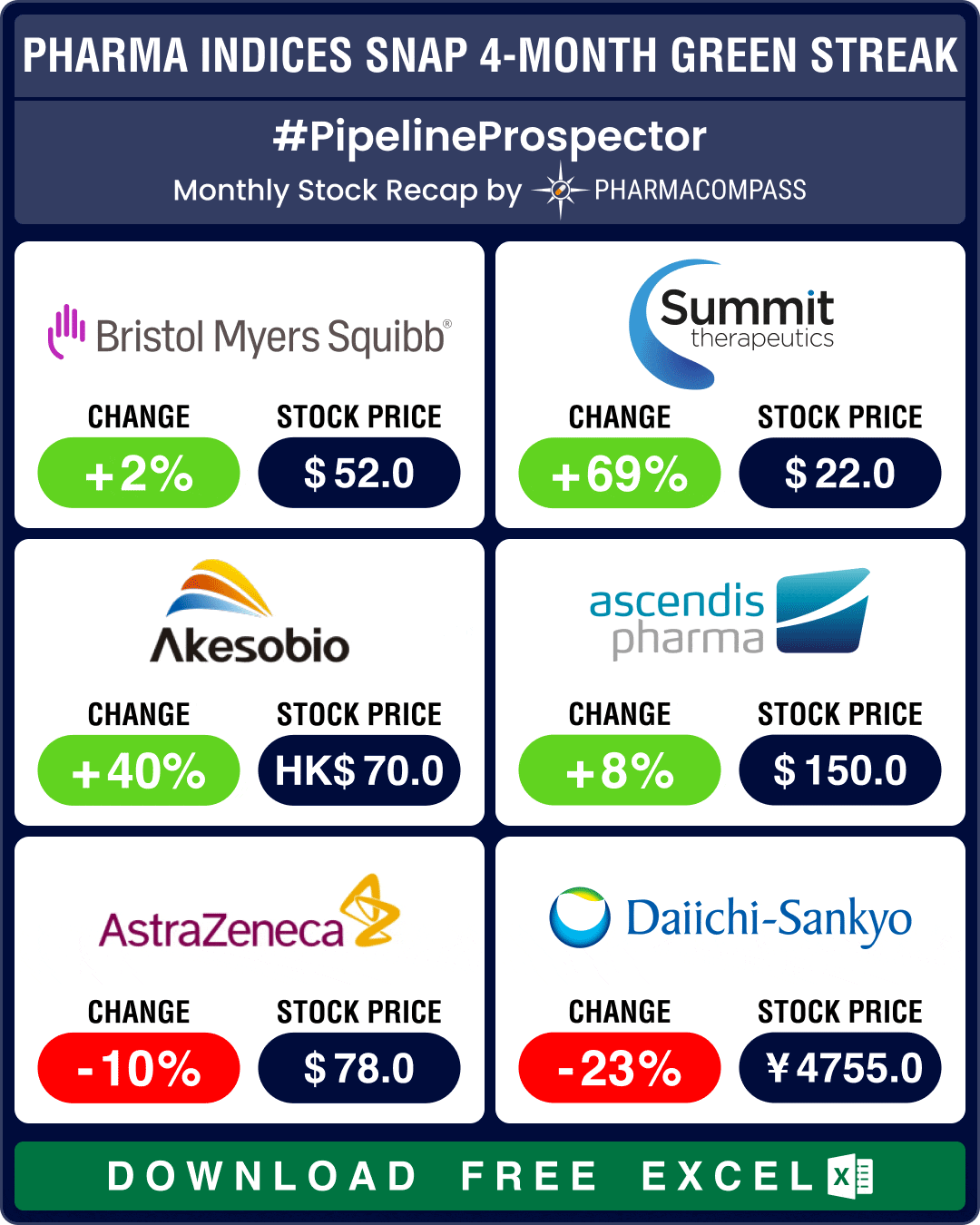
By PharmaCompass
2024-10-03
Impressions: 2392
Pharma indices settled slightly lower in September after four months of solid gains. The three major pharma indices dropped about 2 percent each. The Nasdaq Biotechnology Index (NBI) closed at 4,767.84, down from 4,870.17, the SPDR S&P Biotech ETF (XBI) dropped to 98.8 from 101.1, and the S&P Biotechnology Select Industry Index (SPSIBI) fell to 7,707.36 from 7,897.9. Despite these declines, September was a dynamic month for the pharmaceutical industry, marked by significant regulatory approvals.
September saw notable developments in the field of chronic obstructive pulmonary disease (COPD). After over a decade, COPD saw two significant approvals. The US Food and Drug Administration (FDA) expanded the label of Regeneron and Sanofi’s mega-blockbuster drug, Dupixent, to include the treatment of COPD. Already a game-changer in treating conditions like asthma and atopic dermatitis, Dupixent became the first-ever biologic medicine for COPD patients in the US.
Additionally, GSK’s asthma drug Nucala scored a vital win in a late-stage study for treating COPD. The British drugmaker reported that the monoclonal antibody significantly and meaningfully reduced the annualized rate of moderate to severe exacerbations of what is the world’s third leading cause of death. These developments come on the heels of FDA’s approval of Verona’s Ohtuvayre in June. Ohtuvayre has a novel mechanism of action for the maintenance treatment of COPD.
Access the Pipeline Prospector Dashboard for September 2024 Newsmakers (Free Excel)
BMS’ Karuna bet pays off with schizo drug approval; FDA okays Astra’s nasal spray flu shot
In what was one of the most closely watched decisions this year, BMS’ KarXT won a landmark FDA approval for treating schizophrenia. Branded Cobenfy, the drug is the first antipsychotic that targets cholinergic receptors. Ever since the 1950s, when antipsychotics began being used to treat schizophrenia, they have worked by blocking a dopamine receptor. But those have been associated with serious side effects like weight gain, high rates of cardiac disease, early death and patients complaining about feeling sluggish and unmotivated.
Cobenfy’s new approach has experts excited, and its peak sales are expected to come in at US$ 7.5 billion a year, validating BMS’ US$ 14 billion acquisition of Karuna Therapeutics. BMS’ stock gained 2 percent.
That wasn’t the only landmark move. FDA approved two treatments for Niemann-Pick disease type C (NPC), an ultra-rare and progressive neurodegenerative disorder. Zevra Therapeutics’ Miplyffa became the first-ever treatment approved for NPC, addressing a critical unmet need for patients who, on average, only live about 13 years. Soon after Miplyffa’s approval, IntraBio’s Aqneursa was also granted approval by the FDA. Designed to alleviate neurological symptoms in both adults and children weighing at least 15 kilograms, Aqneursa stands out as the only FDA-approved stand-alone therapy for NPC.
Just in time for winter, AstraZeneca’s first self-administered flu vaccine — FluMist — also bagged FDA approval last month. This nasal spray vaccine can be used at home, potentially increasing vaccination rates among needle-averse individuals.
Access the Pipeline Prospector Dashboard for September 2024 Newsmakers (Free Excel)
Astra’s Tagrisso okayed for inoperable lung cancer; UCB Bimzelx bags 3 new approvals
Months after AstraZeneca’s Tagrisso posted impressive phase 3 results, the drug received FDA approval for treating inoperable, stage 3 epidermal growth factor receptor-mutated (EGFRm) non-small cell lung cancer (NSCLC). This makes Astra’s blockbuster the first targeted therapy for the indication.
UCB’s Bimzelx secured three new FDA approvals for treating adults with active psoriatic arthritis, non-radiographic axial spondyloarthritis, and ankylosing spondylitis. With a novel approach to treating these chronic inflammatory diseases, the company expects Bimzelx to significantly bolster sales, with peak sales of the med projected at € 4 billion (US$ 4.4 billion) or more.
Eli Lilly’s Ebglyss was approved for moderate-to-severe eczema in patients who are unable to control symptoms with topical or other systemic treatments. Notably, Ebglyss offers a more convenient once-monthly dosing compared to twice-monthly for competitors, a feature that analysts note as attractive to both experts and patients.
Access the Pipeline Prospector Dashboard for September 2024 Newsmakers (Free Excel)
Astra-Daiichi’s ADC suffers double whammy; Intercept’s Ocaliva faces setback
The month also brought its share of challenges. AstraZeneca (stock down 10 percent) and Daiichi Sankyo’s (stock down 23 percent) investigational antibody-drug conjugate (ADC) datopotamab deruxtecan suffered a double blow in late-stage trials. It first failed to significantly outperform the standard-of-care chemotherapy — docetaxel — in treating NSCLC. And then it failed to show notable improvement in overall survival compared to chemotherapy in breast cancer.
Analysts had expected datopotamab deruxtecan to potentially become one of Astra’s best-selling drugs. The British-Swedish drugmaker had paid Daiichi US$ 1 billion upfront and promised an additional US$ 5 billion in milestone payments.
Intercept Pharmaceuticals faced a major setback as FDA’s advisory committee voted against the confirmatory data for Ocaliva, which was granted accelerated approval in 2016 for primary biliary cholangitis.
Vanda Pharmaceuticals hit back at FDA after the agency issued it a Complete Response Letter, declining to approve its drug — tradipitant — to treat gastroparesis. The company expressed deep frustration, highlighting the urgent need for new treatments.
Access the Pipeline Prospector Dashboard for September 2024 Newsmakers (Free Excel)
GSK’s asthma drug halves attacks; Abbvie’s Parkinson’s med meets all endpoints
Among late-stage wins, GSK’s new long-acting asthma drug, depemokimab, reduced asthma exacerbations by 54 percent and achieved a 72 percent reduction in exacerbations that required hospitalization or an ER visit. GSK is counting depemokimab among one of its 12 blockbuster launches and expects it to generate £ 3 billion (US$ 3.9 billion) in annual peak-sales.
Similarly, Abbvie’s tavapadon, which was the subject of its US$ 8.7 billion buyout of Cerevel Therapeutics, met its primary and secondary endpoints in patients with early Parkinson's disease.
Akeso and Summit Therapeutics’ experimental drug ivonescimab beat the world’s best-selling drug Keytruda hands down in a late-stage NSCLC trial. Ivonescimab reduced the risk of disease progression or death by 49 percent compared to Keytruda. Akeso and Summit’s stock jumped 40 percent and 69 percent, respectively.
And, Ascendis Pharma announced topline data from a pivotal trial on TransCon CNP, a therapy to treat achondroplasia, a common form of dwarfism. TransCon CNP demonstrated a statistically significant annualized growth velocity of 5.89 cm/year in children treated, compared to 4.41 cm/year in the placebo group.
Access the Pipeline Prospector Dashboard for September 2024 Newsmakers (Free Excel)
Our view
While September didn’t witness a mega-deal, it did see groundbreaking advancements being signed off by the FDA. We have seen enough ups and downs in the pharma indices this year. Let’s hope the final quarter of the year ends on a strong note, both in terms of drug approvals and indices.
Access the Pipeline Prospector Dashboard for September 2024 Newsmakers (Free Excel)
Pharma & Biotech Newsmakers in September 2024
| Company | Country | Currency | Market Cap (Bn) | Change In Market Cap (M) | Stock Price | Change In Price |
|---|
The PharmaCompass Newsletter – Sign Up, Stay Ahead
Feedback, help us to improve. Click here
Image Credit : PHARMA INDICES SNAP 4-MONTH GREEN STREAK by PharmaCompass license under CC BY 2.0
“ The article is based on the information available in public and which the author believes to be true. The author is not disseminating any information, which the author believes or knows, is confidential or in conflict with the privacy of any person. The views expressed or information supplied through this article is mere opinion and observation of the author. The author does not intend to defame, insult or, cause loss or damage to anyone, in any manner, through this article.”







